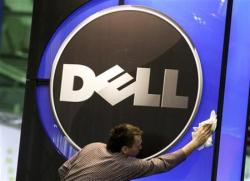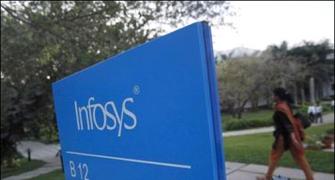The writer feels Dell's valuation is cheap, though its market capitalisation is $20 billion, as it generates a high free cash flow. The buyer can use this to pay off the debt raised for acquiring the company. A $20 billion leveraged buyout of Dell is too big for one buyout firm alone. And club deals are infamous - think the troubled $45 billion buyout of TXU in 2007.
A $20 billion leveraged buyout of Dell is too big for one buyout firm alone. And club deals are infamous - think the troubled $45 billion buyout of TXU in 2007.
Moreover, the computer maker's shrinking business doesn't look that attractive. But an LBO could still deliver high returns because, unlike credit bubble-era targets, Dell is cheap.
Dell has plenty of warts. Half of the company's revenue and an equivalent amount of profit come from selling personal computers, according to analysts.
The top line of that business is declining at about a 10 percent annual rate, as tablets and Apple computers eat into demand. The public's frigid reception of Microsoft's newest operating system, Windows 8, means a further drop-off in sales is likely.
However, Dell also produces prodigious amounts of black ink - free cash flow over the past 12 months was more than $3 billion. The market doesn't value that very highly, with Dell's market capitalisation, even after buyout rumours, at about $22 billion.
That makes the firm a potentially attractive quarry for the likes of Silver Lake Partners, which is considering leading a deal. If shareholders settle for a 15 percent premium over today's market price, Dell's enterprise value for an LBO would be about $20 billion after adjusting
Supposing an equity check covered 40 percent of that, a deal would call for $12 billion of debt. U.S. banks could easily find that.
At say 6 percent interest, the debt would cost Dell some $700 million a year. Even assuming PCs continue to wither at a 10 percent pace, the company's cash flow could still pay that off within seven years.
The bigger barrier may be the $8 billion of equity needed. Rolling over Michael Dell's 16 percent stake would reduce the need for new money, and a buyer group would probably want to keep the founder involved.
Still, it's so big that Silver Lake will need help from other private equity shops, sovereign wealth funds or perhaps more cash from Michael Dell. That complicates matters.
Transactions involving multiple firms have proven problematic in the past as investors differ on management and the timing of an exit. But Dell is so cheap that cobbling together a consortium - and smashing the recent record for an LBO - could be worth the effort.
Context News
Dell is in advanced talks to go private, with Silver Lake Partners leading the deal, according to Reuters sources.
The private equity firm has lined up financing with at least four major banks, namely Credit Suisse, Bank of America Merrill Lynch, Barclays and RBC.
Dell's market capitalisation is more than $20 billion. The company's chief executive and founder, Michael Dell, owns just under a 16 percent stake, worth about $3.5 billion.
The author is a Reuters Breakingviews columnist. The opinions expressed are his own.








